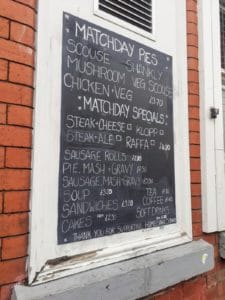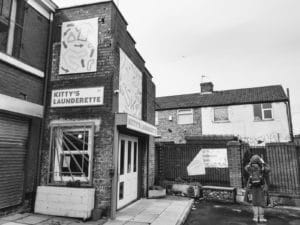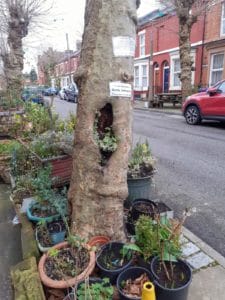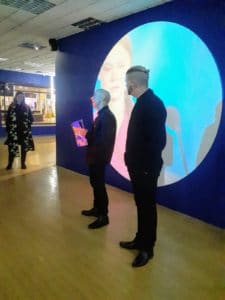Het heeft iets ongelooflijk kneuterigs. Terwijl buiten de storm door verlaten, dichtgespijkerde winkelstraten vol slooprijpe minihuisjes giert, pasteitjes bakken tegen de malheur. Maar het werkt dus wel. Aan de kant van The Kop, de beroemdste tribune van het Anfield stadion aan de Oakfield Road in Liverpool, vestigde de Nederlandse kunstenares Jeanne van Heeswijk in 2012 een buurtcoöperatie, toen megalomane stadsvernieuwingsplannen rond het bekendste stadion van de UK, de oude volksbuurt die de bakermat was van de voetbalclub, dreigden te verwoesten.
Ze bakken er nu de lekkerste taartjes van Liverpool en wijde omgeving, en verdienen inmiddels genoeg om het eerste blok slooprijpe huizen op te kopen. De buren zijn zelf projectontwikkelaar geworden. Ze toveren de krotten om in woningen die nog betaalbaar zijn voor de oorspronkelijke bewoners. Want daar is het de bakkers van Homebaked om te doen: een leefbare volksbuurt waar mensen die er al generaties geworteld zijn, kunnen blijven wonen.
Geld terug

Homebaked levert nu ook de pasteitjes voor de vipsuites in het stadion van Liverpool. ‘Zo vloeit er een beetje geld terug van het al het kapitaal dat in deze buurt verdiend wordt.’ Strijdlust in gebak. En het smaakt nog goed ook.
Een paar blokken van Homebaked, in een zo mogelijk nog slechter deel van Everton, troffen we Kitty’s Laundrette. Het is een wasserette die je eigenlijk alleen in Engeland kunt bedenken. Het is een door buurtbewoners en kunstenaars gerunde wasserette die tegelijk ook een buurtcentrum is. Je kunt er thee drinken, er zijn literaire middagen, muziekprogramma’s: alles wat de desolate omgeving een klein beetje leefbaarder maakt. Hartverwarmend hoe hier kunst in innige samenwerking met de buurt iets daadwerkelijk nuttigs doet in de strijd tegen het (als niets anders te kwalificeren) grootkapitaal dat alleen maar aan gentrificatie werkt, niet om het leven te verbeteren, maar om geld te verdienen aan vastgoed.

De mooiste reden voor de bemoeiens van kunstenaars met arme wijken vertelde Grace Harrison, een van de initiatiefnemers zelf: ‘Hartstikke mooi dat de musea gratis zijn, maar wat als je geen geld hebt voor de bus ernaartoe, of schone kleren?’
Assemble
Aan de andere kant van de stad heeft speculatie en economische achteruitgang ervoor gezorgd dat de ooit levendigste winkelstraat van Liverpool leegliep. Toen ook hier grootschalige sloop dreigde, kwamen de buurtbewoners in opstand. Uiteindelijk leidde dat tot de oprichting van ook weer een buurtcoöperatie, die er nu voor zorgt dat de stadsvernieuwing kleinschalig en duurzaam wordt aangepakt, en de vernieuwde woningen betaalbaar en groen blijven. Architectenbureau Assemble won met hun inzet voor dit project in 2015 de prestigieuze Turner Prize.
Wandelend door de buurt zie je afschuwelijke leegstand, maar ook een levenslust en optimisme die ik in vergelijkbare projecten in Nederland vaak mis. Zelf werkte ik in de jaren negentig als projectassistent in de stadsvernieuwing van Utrecht Noord. Daar speelden voor een deel dezelfde problemen die nu in Liverpool spelen. De woningen waren ooit, in de jaren zestig, bedoeld om te slopen, daarna, in de jaren zeventig, tegen woekerprijzen aan bewoners verkocht, die vervolgens, toen de crisis van 1987 eenmaal toesloeg, geen geld meer hadden om hun buurt en hun woning op te knappen.
Initiatief

De kleinschalige kunstenaarsprojecten die ik nu in Liverpool zie, zijn inspirerender dan wat destijds de kraakbeweging in Nederland voor elkaar wist te krijgen. In Liverpool zijn het de buurtbewoners zelf die het heft in eigen hand nemen en heel ondernemend aan de slag gaan. Vaak geholpen door creatives die hun anarchistische inslag uit een krakersverleden hebben meegenomen, maar zakelijker, en meer hands-on dan ik eerder in Utrecht zag.
Eigenaarschap is een prachtig ding om te voelen. Mensen die het heft in eigen hand nemen, die niet afwachten wat er in de betonnen raadhuizen en ontwikkelaarshoofden wordt bekonkeld. Het levert prachtige dingen op, die geduld vergen, maar heel veel trots opleveren. Meestal brengt crisis vooral veel ellende met zich mee, maar een enkele keer levert het energie op, die kan werken, mits krachtige partners zich tijdig met de jonge aanplant bemoeien.
Onoplosbare leegstand

Of het overal werkt, is ook dan nog de vraag. In Wigan, tussen Liverpool en Manchester in, vloog de gemeente zelf twee beroemde kunstenaars (Al&Al) in om een stervend winkelcentrum te redden. Ze kregen, na enig doorzetten, de hele bovenverdieping ter beschikking en vestigden er een enorme galerie en ‘makerspace’, The Fire Within. Wigan moet met deze inzet de culture hub van Greater Manchester worden. Daarom heeft Wigan het gebied teruggekocht en krijgen de makers er vijf jaar de tijd om de boel om te bouwen tot een hotspot. Het ziet er gelikt uit, en de plannen van de gemeente zijn ambitieus, maar het hele project komt vooral over als window dressing.
Zolang de laatste trein uit Manchester Picadilly naar Wigan al om half acht ’s avonds vertrekt, gaat het moeilijk werken. The Fire Within lijkt palliatieve sedatie voor een Shopping Mall die, geopend in 1991, in 2020 gedoemd is. Aan de overkant van de straat is drie jaar geleden een groter, meer op de huidige tijdgeest ingesteld winkelcentrum geopend. Daar zijn de laatste winkels heen verhuisd. Voor zolang als het duurt.
In Wigan zijn de kunstenaars toch vooral een tijdelijk ding, een bijna opportunistisch gebruiksvoorwerp in handen van een gemeente die nog steeds geen oplossing heeft voor de neergang van de aloude fysieke winkelstraat. Ook dat is Manchester. Amazon.uk heeft in Wigan alvast een paar hele grote blokkendozen neergezet. Daar wordt nu het geld verdiend.
Eerder afleveringen:
Verstop de boeken, als je volk in de bieb wil hebben. (Lessen uit Manchester, aflevering 2)
Volgende aflevering:
